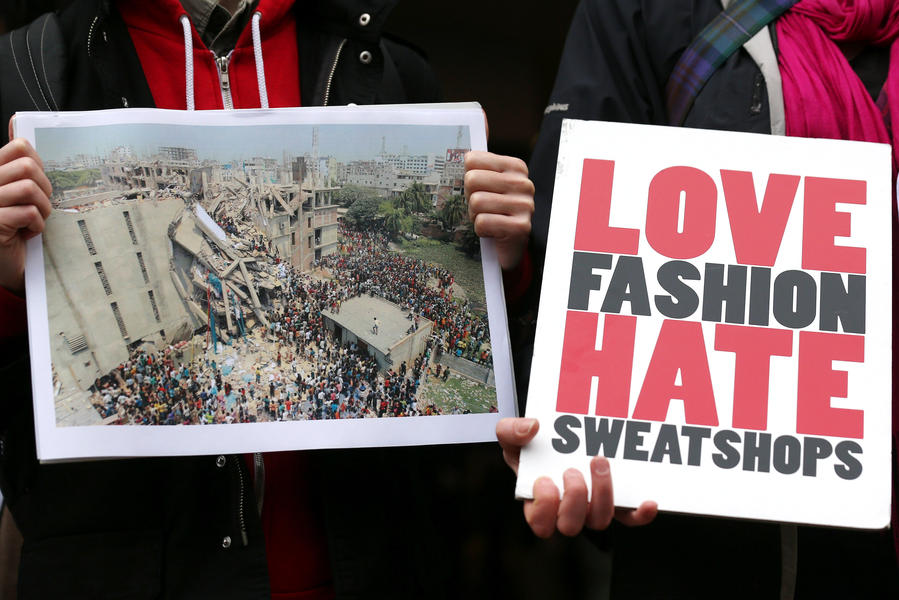Retailers are bickering over how to help Bangladeshi garment factory workers
Oli Scarff/Getty Images


A free daily email with the biggest news stories of the day – and the best features from TheWeek.com
You are now subscribed
Your newsletter sign-up was successful
One year after the Rana Plaza factory in Bangladesh collapsed, killing 1,129 workers, Western retailers and apparel brands are divided into two factions, both trying to improve conditions but disagreeing about everything from inspection processes to how to best help garment workers, The New York Times reports.
The Bangladesh Accord for Fire and Building Safety has more than 150 members, including the European brands H&M and Mango. The Alliance for Bangladesh Worker Safety counts as members 26 American and Canadian companies, including Target, Walmart, and Gap. The predominantly American alliance points out that they have done more inspections at factories than the Europe-led accord, while members of the accord argue that the alliance has lower standards. Alliance members have also said that the accord should pay wages to workers at a factory that was closed for safety reasons in March.
The rivalry is being downplayed by leaders. "This is really not a competition between the alliance and the accord," says Ellen Tauscher, chairwoman of the alliance's board. "This is about working together to change the lives of workers in Bangladesh."
The Week
Escape your echo chamber. Get the facts behind the news, plus analysis from multiple perspectives.

Sign up for The Week's Free Newsletters
From our morning news briefing to a weekly Good News Newsletter, get the best of The Week delivered directly to your inbox.
From our morning news briefing to a weekly Good News Newsletter, get the best of The Week delivered directly to your inbox.
Both sides do agree that conditions in many of the factories are grim; inspectors have discovered buildings so crowded with people and equipment that the columns have cracks, and fire stairways that lead to indoor work areas, not outside. It's not cheap to fix these problems; a new sprinkler system, for example, costs more than $250,000.
Dara O'Rourke, a professor at the University of California, Berkeley and an expert on workplace monitoring, says he hopes that ultimately the Bangladeshi workers end up on top. "There's one good aspect about the competition," he tells The Times. "It's pushing both sides to raise the bar on what they're doing to improve safety."
A free daily email with the biggest news stories of the day – and the best features from TheWeek.com
Catherine Garcia has worked as a senior writer at The Week since 2014. Her writing and reporting have appeared in Entertainment Weekly, The New York Times, Wirecutter, NBC News and "The Book of Jezebel," among others. She's a graduate of the University of Redlands and the Columbia University Graduate School of Journalism.
-
 House votes to end Trump’s Canada tariffs
House votes to end Trump’s Canada tariffsSpeed Read Six Republicans joined with Democrats to repeal the president’s tariffs
-
 Bondi, Democrats clash over Epstein in hearing
Bondi, Democrats clash over Epstein in hearingSpeed Read Attorney General Pam Bondi ignored survivors of convicted sex offender Jeffrey Epstein and demanded that Democrats apologize to Trump
-
 Are Big Tech firms the new tobacco companies?
Are Big Tech firms the new tobacco companies?Today’s Big Question Trial will determine if Meta, YouTube designed addictive products
-
 Nobody seems surprised Wagner's Prigozhin died under suspicious circumstances
Nobody seems surprised Wagner's Prigozhin died under suspicious circumstancesSpeed Read
-
 Western mountain climbers allegedly left Pakistani porter to die on K2
Western mountain climbers allegedly left Pakistani porter to die on K2Speed Read
-
 'Circular saw blades' divide controversial Rio Grande buoys installed by Texas governor
'Circular saw blades' divide controversial Rio Grande buoys installed by Texas governorSpeed Read
-
 Los Angeles city workers stage 1-day walkout over labor conditions
Los Angeles city workers stage 1-day walkout over labor conditionsSpeed Read
-
 Mega Millions jackpot climbs to an estimated $1.55 billion
Mega Millions jackpot climbs to an estimated $1.55 billionSpeed Read
-
 Bangladesh dealing with worst dengue fever outbreak on record
Bangladesh dealing with worst dengue fever outbreak on recordSpeed Read
-
 Glacial outburst flooding in Juneau destroys homes
Glacial outburst flooding in Juneau destroys homesSpeed Read
-
 Scotland seeking 'monster hunters' to search for fabled Loch Ness creature
Scotland seeking 'monster hunters' to search for fabled Loch Ness creatureSpeed Read
